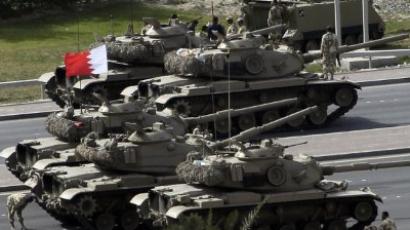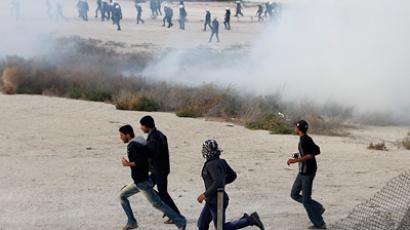Bahrain arrests main human rights activist Nabeel Rajab
Bahraini authorities have arrested Nabeel Rajab, rights activist and foremost critic of the Al Khalifa regime, as they continue their brutal crackdown on peaceful protesters. It comes after he was interviewed on Julian Assange’s “The World Tomorrow.”
Nabeel Rajab, the president of the Bahrain Center for Human Rights was detained at Bahrain’s international airport on his return from Lebanon. The authorities have not commented on the reasons behind the arrest.Julian Assange, whose talk-show featuring Rajab will be broadcast on RT on May 8, believes the activist was arrested because of the program.Rajab has played a significant role in anti-regime demonstrations over the past months. The Bahrain Center for Human Rights has been focusing on drawing attention to the crackdowns on demonstrators and abuses by Bahrain’s security forces. Rajab is also affiliated to international groups such as Human Rights Watch.For fourteen months Al Khalifa forces have been using stun grenades, tear-gas and pepper-spray on protesters, though this was not enough to draw the attention of Western media. The abuses only came into the spotlight because of the protests surrounding the prestigious F1 Grand Prix event.The protests against the Al Khalifa family, who have ruled Bahrain for two centuries, began in February 2011 as the Arab Spring revolutions swept across the region. The unrest was fueled by sectarian divisions. The ruling family are Sunni Muslims, while 70 per cent of the population are Shiites, who are now demanding greater rights and freedoms.
In March 2011, King Hamad bin Isa al-Khalifa asked the Gulf Cooperation Council to help protect his country, claiming that Iran was backing the opposition. This resulted in Saudi-led intervention in the country.Official reports say around 85 civilians have been killed during the 14 months of the crackdown, but activists say that the real figure exceeds this number many times.While calling for Syrian leader Bashar Assad to step down, the US has been arming Bahrain’s monarchy against peaceful demonstrators. Some point out the main reason for this is that the US Fifth Fleet is based in the tiny island nation in the Persian Gulf, across the water from Iran.Nabeel Rajab has criticized the US many times for arming the Bahrain authorities and turning a blind eye to the violence. All the more outrageous then, Rajab says, that the US is assuring everyone that the situation in Bahrain is improving.“America’s representative in the Human Rights Council is saying 'We will not talk about Bahrain this session because Bahrain is improving itself and it is doing better' when people are dying on a daily basis.”To say the least, the events in Bahrain have received way less coverage than other Arab protests.He claimed that major Arab channels have been ignoring the crackdown on protesters in Bahrain because they are controlled by the same ruling families, who do not want to see any pro-democracy uprisings in their kingdoms. “When it comes to Bahrain, this is the last thing the Saudis want to see – a revolution in Bahrain… which is going to have a negative impact on Saudi Arabia.”The Saudis sent troops to Bahrain to help its Sunni rulers quell the mostly Shiite uprising first of all because of their close ties with the West, believes Rajab. The Saudis did it “for the interests of the United States, for the interests of many European countries, for arms sales, for the flow of the oil,” he told the host of the “World Tomorrow.” Rajab pointed out that the Saudis, the US and other Western countries seemed to prioritize their mutual interests over and above the human rights of the people of Bahrain. The fourth episode of Julian Assange’s show “The World Tomorrow”, featuring Nabeel Rajab and Egyptian activist Alaa Abd El-Fattah, will be aired on RT on Tuesday at 11:30 GMT.Strikingly, the activist told Assange he has already been detained, kidnapped and beaten in front of his family due to his sharp criticism of the regime.Nabeel Rajab told Assange how he was detained for almost half a day after been beaten up in the street. Rajab recalled that a few months prior to the latest detention he was kidnapped from his home by masked security personnel, blindfolded and handcuffed, and taken to an unknown place where he was tortured. The program was recorded last week. During the interview Rajab said that on the same day he announced on his Twitter account that he is going to appear on RT his house was surrounded by almost 100 policemen armed with machine guns – but luckily he was not there at the time.One of Rajab’s aims is to attract international attention to the situation in Bahrain.Nabeel Rajab resented the fact that when Saudi Arabia invaded Bahrain to suppress protests, the international media turned a blind eye to that controversial intervention. The human rights activist blamed the same Saudi Arabian regime for sending troops to Libya to topple Muammar Gaddafi and now sponsoring an attempt of regime change in Syria, supporting opposition fighting the serving President Bashar al-Assad.Rajab stressed that the revolution in Bahrain is still going on, with half of the population of the country taking part in it. “In none of the revolutions we had in the history of the past 50 years would you see 50 per cent of the population out in the street in one protest. But you will see [this] in Bahrain.”














